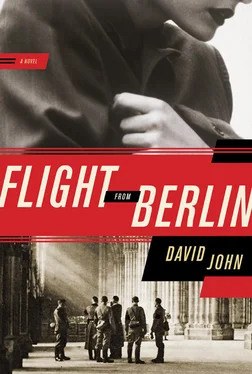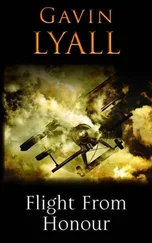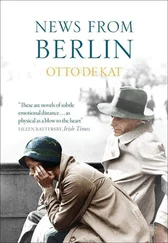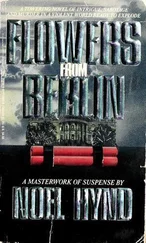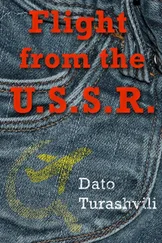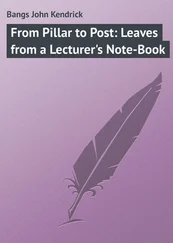David John - Flight from Berlin
Здесь есть возможность читать онлайн «David John - Flight from Berlin» весь текст электронной книги совершенно бесплатно (целиком полную версию без сокращений). В некоторых случаях можно слушать аудио, скачать через торрент в формате fb2 и присутствует краткое содержание. Жанр: Шпионский детектив, на английском языке. Описание произведения, (предисловие) а так же отзывы посетителей доступны на портале библиотеки ЛибКат.
- Название:Flight from Berlin
- Автор:
- Жанр:
- Год:неизвестен
- ISBN:нет данных
- Рейтинг книги:4 / 5. Голосов: 1
-
Избранное:Добавить в избранное
- Отзывы:
-
Ваша оценка:
- 80
- 1
- 2
- 3
- 4
- 5
Flight from Berlin: краткое содержание, описание и аннотация
Предлагаем к чтению аннотацию, описание, краткое содержание или предисловие (зависит от того, что написал сам автор книги «Flight from Berlin»). Если вы не нашли необходимую информацию о книге — напишите в комментариях, мы постараемся отыскать её.
Flight from Berlin — читать онлайн бесплатно полную книгу (весь текст) целиком
Ниже представлен текст книги, разбитый по страницам. Система сохранения места последней прочитанной страницы, позволяет с удобством читать онлайн бесплатно книгу «Flight from Berlin», без необходимости каждый раз заново искать на чём Вы остановились. Поставьте закладку, и сможете в любой момент перейти на страницу, на которой закончили чтение.
Интервал:
Закладка:
They reached the high gates of number 80, fashioned in a design of wrought iron leaves, flowers, and ribbons. On either side two tall stone gateposts held iron carriage lamps in yellow glass.
‘Think we should ring the bell?’ Eleanor said.
Peering through the bars, they saw a gravel driveway that curved out of sight behind rhododendron bushes, over which a fairy-tale turret could be glimpsed.
‘The gate’s open,’ said Denham. It yielded with a deep, ferrous groan, and they entered the grounds. Behind the foliage stood a tall house of glazed yellow bricks, with a pointed roof, arched Gothic windows, and two towers, one cylindrical, the other crenellated like a medieval keep. Beyond the building were mown lawns and a pier giving onto a boating lake.
Eleanor made a low whistle. ‘A castle for a princess.’
On a curve in the driveway was parked a gleaming black Opel, its engine humming. The driver stood on the other side of it, smoking and watching them approach. It was several seconds before they noticed, through the glass of the car windows, the blood-red armband on his uniform.
‘Now what?’ Eleanor muttered as they crunched towards the porch. ‘He’s seen us. We can’t just turn around.’
The front door of the house opened. Raised voices came from inside the hall, and two men emerged onto the steps, one of them saying, ‘You’ll hear from us,’ to whoever was seeing them out.
The first man wore a fedora, a tailored suit, and cotton gloves. He had a white moustache twirled into pins, and a pince-nez, through which he cast them a curious look as he approached the car. Under his arm, Denham noticed, was a copy of Die Kunst im Dritten Reich, the Nazi art periodical. His companion, who’d made the abrupt farewell at the door, swaggered out in polished boots, a brown uniform with a gold-trimmed swastika armband and a collection of decorations glinting on his breast-a golden pheasant in full plumage. He was tall, with a florid face, fat lips, and a head of thick grey hair that clashed oddly with the brown garb.
Denham felt the pheasant’s gaze fall upon him, before moving to Eleanor, whom he looked up and down. Eyes the colour of dishwater.
‘You have business here?’ he asked.
‘We’re calling from the Lutheran Church,’ Denham said, in his best Berliner accent.
‘Niemoller’s lot?’
‘Not us.’
The dishwater eyes sharpened for a moment, as if committing their faces to memory. ‘You’re wasting your time,’ he said, getting into the car. ‘They’re Jews.’
‘Ah. Thank you.’
The Opel’s engine moved into gear, and the car sped off over the gravel and out of sight around the curve in the drive.
‘We’re not from the church,’ Denham said to the maid standing by the open door at the top of the steps. ‘We’re friends of Roland and Hannah Liebermann’s.’
‘Who is it now, Lore?’ came a deep voice from inside the hall. Denham gave the maid their names, and they were asked to wait. She returned a moment later and showed them into a large, brightly upholstered sitting room with a ceiling higher than a double-decker bus, where tasselled velvet curtains were half drawn against the bleaching power of sunlight. Denham could see why. Almost every inch of wall was hung with canvases-some small, others the size of billiard tables. Colourful, dynamic, modern works; some were even familiar to him, or rather the artist’s style was familiar. His eyes were drawn to a large, dreamlike piece from the Blue Rider School, above the oversized stone fireplace.
‘Beautiful…,’ Eleanor said.
Dozens of horses galloped towards the viewer, one over the other, moving in a great purple-blue wave.
‘Franz Marc, the artist,’ said a deep voice, ‘was a friend of mine.’
They had not noticed the man standing at a walnut drinks cabinet next to the mantelpiece, pouring himself a glass of cognac, which he knocked back in one gulp. He was about sixty-five, bald, with a trimmed grey beard, a long nose, and pale, weary eyes. A port-wine mark covered part of his left cheek like a thumbprint. His dark suit and waistcoat cut a sombre presence amid such colour.
‘My children told me to expect you,’ he said in English, beckoning for them to sit. There was a strong Yiddish clip to his voice and he spoke ponderously, as though there was nothing left to hurry for. ‘They said you are journalists taking a great risk to see Hannah, and for that you are welcome. In times like these courageous people are few. I am Jakob Liebermann.’
He wound a bell handle next to the fireplace, and they heard a distant chime. On the coffee table before them was a year-old copy of Life magazine, with Hannah on the cover, holding her foil. The photograph was a soft monochrome in which a makeup artist had given her the femme fatale treatment, with lips and hair dark and ravishing.
‘Please understand I do not normally drink at this hour, but after the meeting that just took place here, I have given myself permission.’
‘Unwelcome visitors?’ Denham ventured.
‘They had no appointment, and I was compelled to receive them, so, yes, you may say that.’
‘Who were they?’ asked Eleanor.
‘Men from the Reich Chamber of the Visual Arts,’ said Herr Liebermann, ‘come to assess the value of my collection.’ He gazed gloomily at a wall behind their heads.
Lore entered, pulling a trolley clinking with china cups and a teapot. ‘Please see where Hannah and Roland are,’ Herr Liebermann said to her, ‘and ask Frau Liebermann to join us, if she’s feeling well enough.’
‘Those men want your art?’ Denham said, surprised. The Nazis had strong views on ‘degenerate art’-or rather, anything that challenged their parochial, reactionary tastes.
‘Not for its own sake,’ said the resonating, slow voice. Herr Liebermann rubbed the bridge of his nose and his eyes, exhausted from whatever exchange had taken place. ‘Otto Dix, Paul Klee, Max Ernst
…’ He gestured vaguely to the walls. ‘Their work is now Verfallskunst- the art of decay. Art to be liquidated.’ He raised his eyebrows in an expression of beleaguered aloofness. ‘That word-so much in vogue today. Those two men will sell this collection at auction in Lucerne and New York… to raise foreign currency for the Reich.’
Denham noticed an embossed business card on the coffee table for a GALLERIE HABERSTOCK, GERMAN DEALERSHIP. He’d seen that a lot recently-adding ‘German’ before ‘lawyer’ or ‘doctor’ to signify that the card bearer was of good Aryan coin.
‘That man,’ said Herr Liebermann, nodding to the card, ‘specialises in these disposals. He’s an art dealer, a businessman like me. Him I could talk to. But the oaf in the uniform told me my collection amounts to “Jewish artistic violence against the German spirit.” ’ He sat down on a divan, shaking his head, seeming to shrink into the folds of his suit.
‘You’re giving them the collection in return for an exit visa?’ Denham asked.
‘Partly. They want a great deal more from me than the art.’
‘But it’s your collection,’ Eleanor said suddenly. ‘Why should
…’ Herr Liebermann silenced her with a raised hand and a melancholy smile.
‘Please,’ he said. ‘Acceptance is the quicker route to wholeness, though I confess that today even I feel unequal to the complexities of our times.’
‘If there’s something we can do-’ Denham said.
‘Thank you, Herr Denham, but I take comfort from the fact that I am a difficult man to rob. By law my banking interests in Berlin will soon be Aryanised, but elsewhere-in Basel, in London, in Amsterdam-my wealth is held by trustees from whom deeds of transfer are required, and for those they need my cooperation. So we’re talking about a deal
Читать дальшеИнтервал:
Закладка:
Похожие книги на «Flight from Berlin»
Представляем Вашему вниманию похожие книги на «Flight from Berlin» списком для выбора. Мы отобрали схожую по названию и смыслу литературу в надежде предоставить читателям больше вариантов отыскать новые, интересные, ещё непрочитанные произведения.
Обсуждение, отзывы о книге «Flight from Berlin» и просто собственные мнения читателей. Оставьте ваши комментарии, напишите, что Вы думаете о произведении, его смысле или главных героях. Укажите что конкретно понравилось, а что нет, и почему Вы так считаете.
